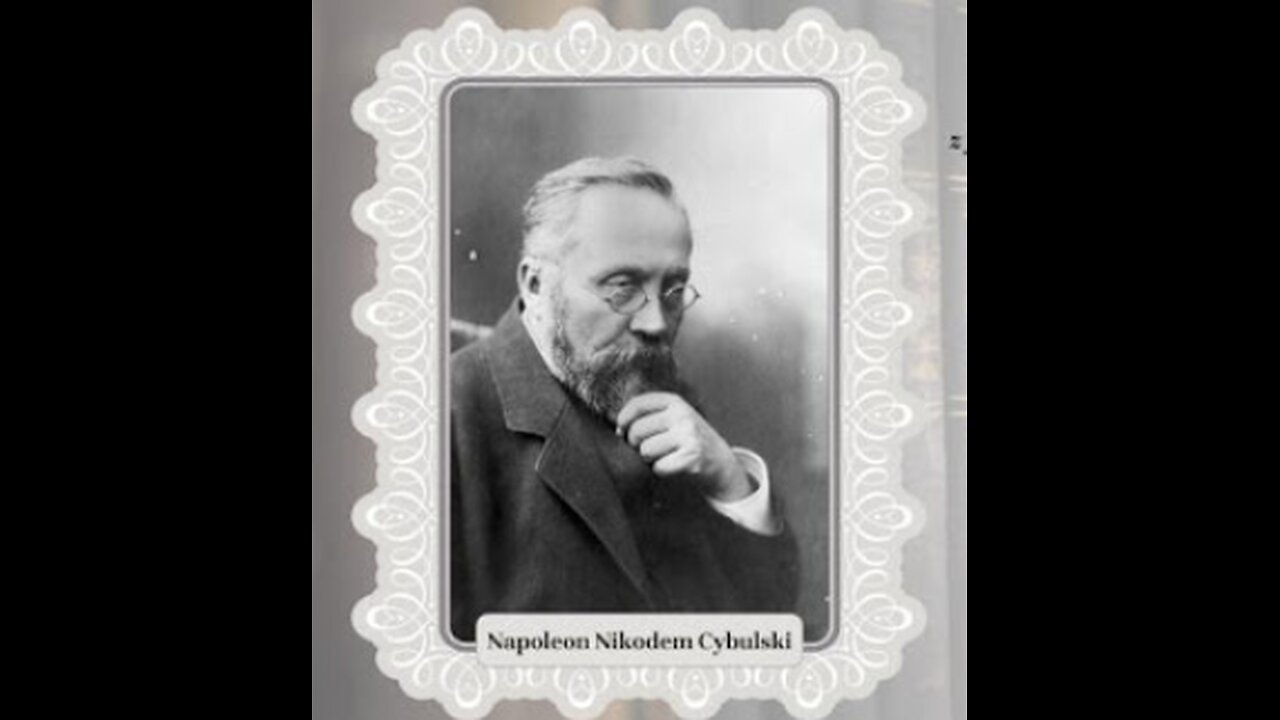Premium Only Content

Polish Genius : Napoleon Nikodem Cybulski
Napoleon Cybulski, co-discoverer of adrenaline. Polish physiologist Napoleon Nikodem Cybulski - one of the founders of world endocrinology, co-discoverer of adrenaline and brain action currents, pioneer of electroencephalography and researcher of hypnosis. In his free time, he was a publicist, social activist, gymnast and dentist.
Napoleon Nikodem Cybulski of the Prawdzic coat of arms was born on September 14, 1854 in Krzywonosy in the Vilnius region (currently the territory of western Belarus) as the son of Józef Napoleon and Marcjanna née Hutorowicz. After graduating from high school in Minsk, he began medical studies at the Military-Medical Academy in St. Petersburg. He established contacts with the future great Russian physiologist Ivan Pavlov, who was studying there at the same time. In 1880, he received his medical diploma cum eximia laude (with special commendation).In the years 1877–1885 he was a student and then an assistant of the outstanding physiologist and biochemist, Georgian prince Ivan Romanovich Tarkhanov (Tarchnishvili), a descendant of the sixteenth-century national hero of Georgia, leader Giorgi Saakadze. During this period, Cybulski invented a photohemotachometer - a device that allowed measuring the speed of blood flow in blood vessels and at the same time recording this process photographically. He was one of the first in the world to record and describe blood flow in the carotid and femoral arteries. Thanks to his work on research on the speed of blood movement, in 1885 he received the degree of doctor of medicine. In the same year, after lecturing for several months at the St. Petersburg Dental School, the scientist moved to Krakow to take over the Department of Physiology, Histology and Embryology at the Jagiellonian University. He managed it until the end of his life. As his student, Professor Adolf Beck, recalled, despite the reluctance of the Austrian government, Cybulski managed to obtain money from various sources, thanks to which he "kindled a great fire of scientific work" and "through his example and example, he woke up other laboratories from sleep." In the following years, he served as dean of the Faculty of Medicine. In 1904, he became the rector of the Jagiellonian University, and later the vice-rector of this university. Napoleon Cybulski created the Krakow school of physiology. His students included Adolf Beck - co-discoverer of functional brain currents and pioneer of electroencephalography, histologist and embryologist - Władysław Szymonowicz, Leon Wachholz - author of the first modern textbooks on forensic medicine, Aleksander Rosner - co-founder of Polish gynecology, and histologist Stanisław Maziarski. Cybulski shared his abundance of ideas with his students and colleagues, and his lectures at scientific societies aroused great public interest.
In 1890, Cybulski constructed a device for measuring the amount of heat produced by muscles - a microcalorimeter. In the same year, he was one of the first to receive an EEG recording of the cerebral cortex, and then, together with Adolf Beck, he conducted electroencephalographic wave research and located the sensory areas in the brain. He studied phenomena occurring in intracranial hypertension, related to the sense of taste and swallowing. In 1895, together with Władysław Szymonowicz, he discovered the effect of an extract from the adrenal medulla - "adrenal gland", containing norepinephrine and dopamine. It was an introduction to the discovery of the "fight and flight hormone" - adrenaline. Previously, it was believed that the nervous system was responsible for all regulatory functions in the body.
Napoleon Cybulski was the first in Poland to undertake research on hypnotism. The book "On Hypnotism from a Physiological Position" contained theses that preceded Sigmund Freud's later concept of the unconscious. In 1910, he was the first Polish researcher to obtain an ECG recording. He considered the possibility of using radioactive substances in medicine. He also dealt with muscle electrophysiology, creating a method of stimulating muscles and nerves by discharging a capacitor that gave more repeatable results. He proved that the conduction of the active state in the nerve is a consequence of chemical processes. Professor Cybulski was a member of the Academy of Arts and Sciences and an honorary member of many medical societies, including: in Vilnius, Lviv and St. Petersburg. He wrote nearly 80 scientific papers. In the years 1891-1896 he published the textbook "Human Physiology". To repair the professor's budget, he ran a private dental practice in Krakow.
His interests were not limited to medicine. In 1890, he became vice-president of the Department of the "Sokół" Gymnastic Society. At one time, he even held the position of president of the Supervisory Board of Agricultural Circles in Krakow. He aimed to raise the level of education and agricultural culture in the region near Krakow, conducting research on the diet of the rural population. Due to a poor diet and lack of health care, Galicia had the highest mortality rate in the entire Habsburg monarchy, and life expectancy was among the lowest in Europe - 28 years. In the years 1900–1909, half of the children there died before the age of five. Professor Cybulski published books and articles such as "Do the state and society have an obligation to support science?" (1895), "On the organization of peasant farms" (1896) and "Science towards war" (1918). As a supporter of allowing women to pursue higher education, in 1891 - together with the first Polish bacteriologist Odo Feliks Kazimierz Bujwid and his wife Kazimiera Bujwidowa (social activist and feminist) - he founded the first girls' high school in Krakow. In 1911, 1914 and 1918 prof. Cybulski was nominated for the Nobel Prize, which he did not receive. For this he was awarded the so-called "Polish Nobel Prize". Erazm and Anna Jerzmanowski for 1918, awarded by the Academy of Learning. The value of this prize was then equivalent to 12 kilograms of gold, which today would be equivalent to almost PLN 2 million.
He was married to Julia Rogozińska. In 1916, he purchased the "Prochownia" manor in Nawojowa Góra near Krzeszowice near Kraków, where he settled with his family.
-
 LIVE
LIVE
Vigilant News Network
3 hours agoUK Government BUSTED in Secret Plot to Extract Your Data | Media Blackout
650 watching -
 LIVE
LIVE
Scottish Viking Gaming
8 hours ago💚Rumble :|: Sunday Funday :|: Smash the Blerps and Vape the Terpes
1,389 watching -
 1:03:32
1:03:32
Winston Marshall
3 days ago"War On Children!" The DEMISE Of The West Starts With Schools - Katharine Birbalsingh
50.9K40 -
 1:45:00
1:45:00
RG_GerkClan
9 hours ago🔴LIVE Sunday Special - It's Time for World Domination - Civilization VII - Gerk Clan
41.3K10 -
 LIVE
LIVE
Major League Fishing
4 days agoLIVE Tackle Warehouse Invitationals, Stop 1, Day 3
226 watching -
 23:34
23:34
marcushouse
10 hours ago $13.10 earnedBREAKING: Starship Launch IMMINENT – But What’s This SURPRISE Flight 9 Plan?! 🚀🔥
87.1K8 -
 8:43
8:43
Film Threat
1 day agoTHE MONKEY | Film Threat Reviews
80.8K3 -
 15:55
15:55
TSPLY
1 day agoThe Media Is Very Afraid Of FBI Director Kash Patel
63K51 -
 6:57
6:57
Cooking with Gruel
1 day agoMake Cheese Great Again
49.2K14 -
 5:17
5:17
Mrgunsngear
1 day ago $9.09 earnedPresident Trump Has Appointed A New ATF Director
52.9K37